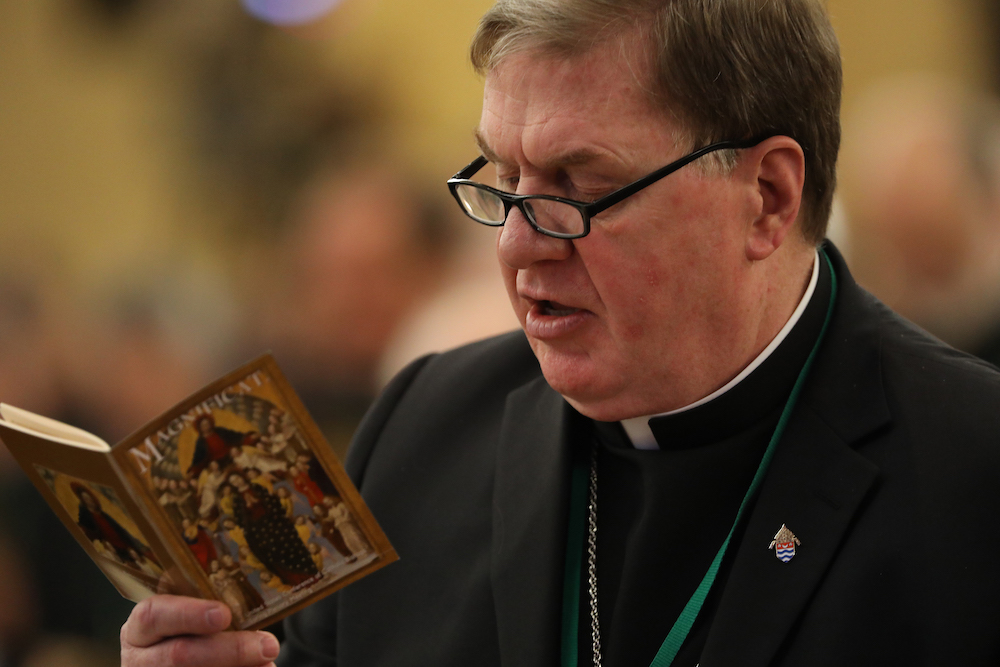The U.S. bishops approved a revised national directory on formation and ministry for permanent deacons June 12, the second day of their June 11-13 spring general assembly in Baltimore.
The vote was 217-5, with two abstentions. A two-thirds majority vote of 180 bishops was needed for passage.
The Vatican approval, known as a "recognitio," for the directory currently in use was scheduled to expire in 2009, but the bishops had secured a pair of five-year extensions from the Vatican so the directory could be more closely scrutinized.
St. Paul VI restored the permanent diaconate in 1967. The Vatican approved it for the United States in 1968 at the request of the bishops.
The proposed version of the directory, which would be a second edition, has already received the approval of the bishops' Committee on Clergy, Consecrated Life and Vocations and been reviewed by the Committee on Canonical Affairs and Church Governance and the Committee on Doctrine.
The bishops' Administrative Committee gave its approval last September for it to be included on the agenda for last fall's general assembly.
However, "given the extraordinary circumstances of the church in the United States in the fall of 2018, the Administrative Committee decided to postpone the discussion and vote," said Cardinal Joseph W. Tobin of Newark, New Jersey, chairman of the bishops' Committee on Clergy, Consecrated Life and Vocations, in introductory remarks to the directory.
Cardinal Tobin was referring to the fresh round of abuse scandals involving claims against a couple of bishops and accusations others were negligent in handling abuse cases that roiled the U.S. church anew last year and was the focus from much of the meeting agenda last November.
The Administrative Committee re-approved in March the directory's placement on the June general meeting agenda.
The proposed directory, which would be effective for all U.S. Latin-rite dioceses, gives instruction on the formation, ministry and life of permanent deacons.
"To the extent he is more present and more involved than the priest in secular environments and structures, he should feel encouraged to foster closeness between the ordained ministry and lay activities, in common service to the kingdom of God," it says.
"So many of the world's people are oppressed by injustice and the denial of their fundamental human rights. Still others are troubled or suffer from a loss of faith in God, or tempted to give up hope," it says, quoting St. John Paul II's address to deacons in Detroit during his 1987 U.S. visit.
The proposed document also speaks about the wives of deacons and their role.
"Although the wife of a married deacon has already given her consent before her husband's ordination to the demands of the diaconal ministry, nevertheless she should be 'kept duly informed of (her husband's) activities in order to arrive at a harmonious balance between family, professional and ecclesial responsibilities,'" it says, quoting the Vatican Congregation for the Clergy's own 1998 directory on deacons.
"Charity should be extended to the widowed deacon as he assesses and accepts his new personal circumstances, so he will not neglect his primary duty as a father to his children or any new needs his family might have."
In a new passage to the proposed directory, it says: "Widows of deacons ought to remain connected with the diaconal community, not only because of support and encouragement, but because of the unique bonds that had been forged by virtue of her husband's ordination."
"In collaboration with his diocesan bishop and the priests of his diocese, the deacon has a special role to promote communion and to counter the strong emphasis on individualism prevalent in the United States," it adds.
Upon ordination, the proposed directory says, "this service will include diocesan and parochial works of charity, including the church's concern for social justice. It will also extend into Christian formation -- working with youth and adults."
"Preaching, with its preparation and practice, requires a significant segment of time in the program of study. Attention should also be given to topics reflecting the specific needs of the church in the United States," the proposed directory says, among them family life, multicultural diversity, the social dimension of the Gospel and "incorporation of the Gospel into all aspects of society."
"Diaconal formation should equip deacons for working on behalf of the poor and indeed be working to put into effect the full range of the social teaching of the church," the proposed directory says in another new passage.
"Formation programs should help the participant to grow in an understating of the church's teaching, and tradition of social justice. ... Formation programs should impart the skills needed for promoting Catholic social teaching, in the marketplace, parish and diocese."
A formation program can be considered successful, the proposed directory says, by the deacon candidate's ability to manifest, among other things, an increase in holiness of life; an ability to clearly articulate the Catholic faith; the capacity to apply church teaching and practice to concrete societal issues and pastoral concerns; a sensitivity to enculturate the Gospel within his ministry and work and home life; and to be "an obedient and humble servant to all in the name of the church."
Men must be at least 35 to be deacons. If they are married when they are ordained, they may not remarry after the death of their wife; if unmarried at ordination, they may not marry.
References to the church's ministry of justice were removed throughout the draft before its originally scheduled presented last November. When asked about this June 11 by Bishop John Stowe of Lexington, Kentucky, Cardinal Tobin said an objection was lodged to those references by the bishops' Committee on Doctrine. "To be consistent in the document with the (deacon's) threefold ministry of word, charity and sacrament, the notion was that justice was subsumed in charity," he noted.

